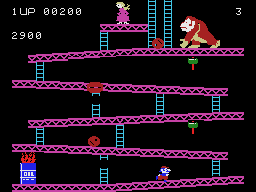
Little did I know that when my brother and I received a ColecoVision game system for Christmas when I was 12 years old, we were unknowingly initiated into the “Gamer Generation”. Growing up playing video games became an enigma that now separates us from our older siblings, parents and many other elders. But unlike most university students, I did not grow up from birth with a mouse in one hand and a cell phone in the other… this puts me in a “tweener” generation that can relate to what teaching and learning used to be like and what may be required now of educators to reach "the gamers".
Today, I rarely find (make) the time to play any video games although I do have an outdated PS1 (original PlayStation) system tucked away somewhere collecting dust. But coming from this experience, and as a former high school teacher, I found myself nodding my head in agreement at much of what Dr. John C. Beck had to say this past Tuesday at the first President’s Lecture Series event. (click here to log into to the DVSS and search for a streaming video of the event)

Here is a summary of his major points made (with some commentaries in parentheses):
John C. Beck (Capturing the Value of the Gamer Generation)
• They think, believe and learn differently
• Growing up on games creates a whole new way of thinking about the world
- - The game worlds are immersive worlds, often competitive
- (they control things, investigate, goal seeking, emotion, decision making/problem-solving)
• Gamers are:
- - More competitive
- Naturally global-thinking
- More social and work better in teams
- Willing to take risks -- attitude of “immunity to failure”
- More confident in abilities -- prefer to be paid based on actual performance rather than a set salary
- Believe more in luck (can be seen as them not caring and shrugging it off)
- Flexible, don’t mind having to change (this will be helpful with the rapid changes we’re just beginning to enter)
- They can easily go “meta”/reflective
• Boys – spatial; girls – linear (success in schools to girls, boys like games for spatial environment)
- Both want to be heroes (“that’s not fair”; kids starting charities and non-profits)
• They want to be challenged; give tough jobs/tasks
- - Natural multi-taskers
- They want fun (to be engaged/interested/pay attention to)
• Games are basically fair (player messes up, they lose, etc.)
• “Strategy guides are good; Level Bosses are not” – that is there implied / undercurrent reality
- - Strategy guides help gamers be successful in getting through a game
- Level bosses are something to be conquered, overcome, killed, etc. in order to move on to the next level
- As a boss (teacher/leader), be a “strategy guide”, NOT a “level boss”
• Competitive, risky, difficult, social, global, heroic – build this type of world for them to be involved in
• All of this will change… so stay current!
- Blogs – potentially creating a world where secrets are less viable
• (Games have the potential to be a training ground for doing good; more games to promote this are forthcoming)
- Game of smiley faces clicked on while traveling over clouds – the study included approx. 130 people – it improved their self esteem
• How will relationships change in future because of this interaction between machine & human?
- Second Life – virtual world allows you to become who you want to be online
• Used to be able to buy things from others on eBay, not anymore
• “Sweat-shops” in India/China that you can contract out – i.e.-pay - to click on mouse a million times so you can gain points in these virtual worlds (Many virtual gamers are outraged by this, see “fair” item above)
• Neural pathways are created up until the age of about 13 – after that, it’s more difficult to change &/or learn (it can be done, but not as fluid or easily attained)
• Gamer generation CONTROLLED the dot.com ride – they were just living out a live video game! Like Super Mario Bros. where you collect gold pieces and once you get enough you can fly!!! – like a corporate jet!
-When the “ride” was over, they were OK… onto the next adventure…
To access an online audio recording of IT Conversations interview with John Beck, ”When Gamers Enter the Workforce” (~17 min.)
No comments:
Post a Comment